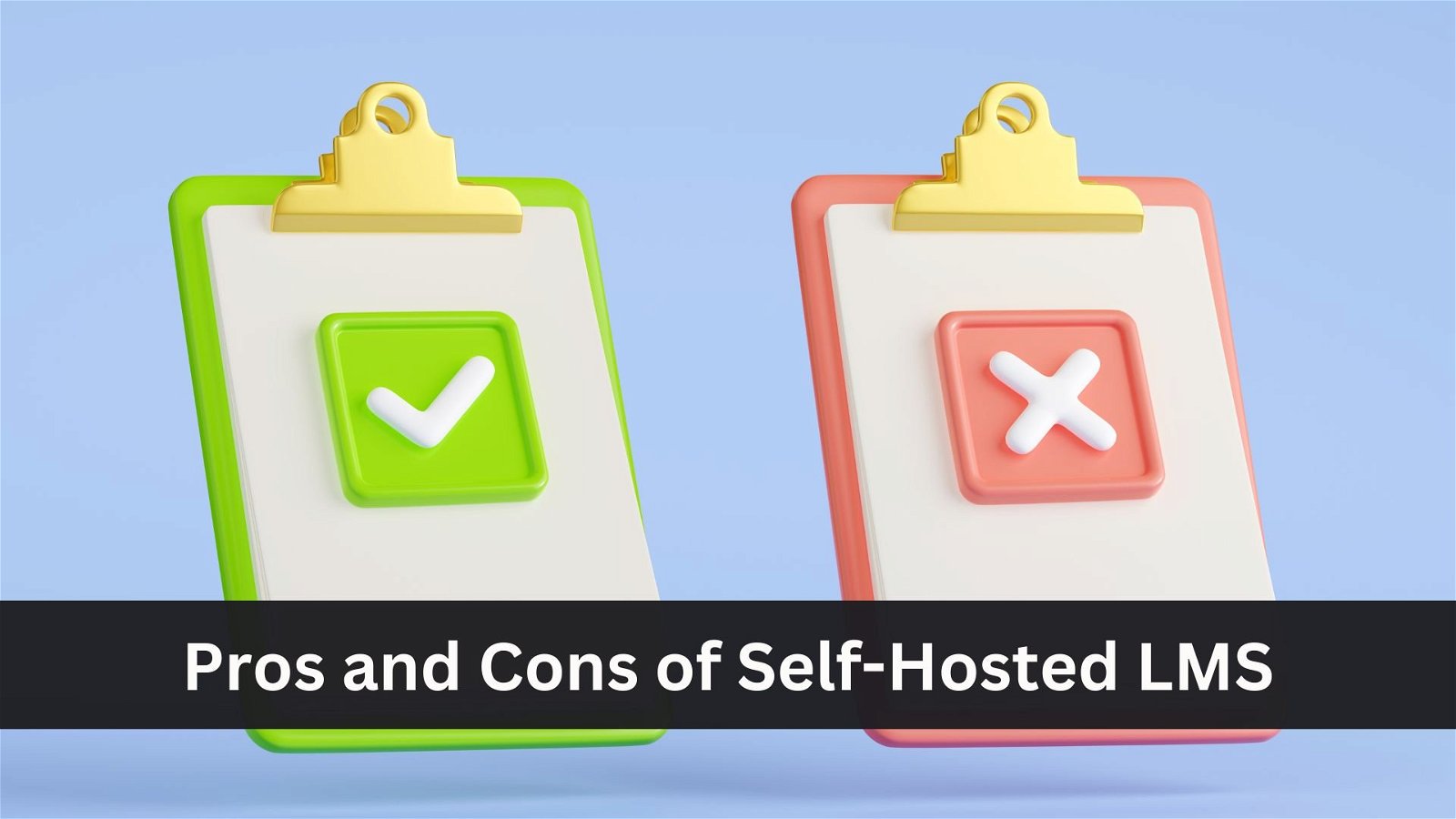A Self-Hosted Learning Management System (LMS) refers to an online education platform that an organization hosts on its servers and infrastructure, allowing for greater customization, control, and flexibility over the learning environment. In contrast to cloud-based solutions, self-hosted LMS entails the organization taking responsibility for the setup, maintenance, and security of the learning platform.

Certainly, both options—self hosted and externally hosted e-learning solutions—come with their own set of advantages and disadvantages, and individuals have achieved success with each. However, determining the right solution for your business demands thoughtful consideration. The decision often hinges on your specific goals and the level of control and responsibility you seek over the end product. To assist you in this decision-making process, let’s explore some key pros and cons associated with self-hosted e-learning.
What is a Self-Hosted LMS?
A self-hosted Learning Management System (LMS) refers to an e-learning platform that an organization or individual installs and operates on their own servers or cloud infrastructure. In contrast to hosted LMS platforms, where the service provider manages the technical aspects and provides a pre-configured environment, a self-hosted LMS grants users full control over the system. Users are responsible for tasks such as server setup, software installation, maintenance, and security measures. This autonomy allows for a high degree of customization, enabling organizations to tailor the LMS to their specific needs in terms of branding, features, and overall functionality. Popular self hosted LMS solutions include LearnDash, Lifter LMS, and other WordPress LMS plugins.
Also Read: WordPress Video Themes for your Website 2024
Pros of Self-Hosted LMS
Control over your LMS platform
On the majority of hosted e-learning platforms, you often find yourself constrained by the predefined structure of the hosting site. Customizing the learning experience or distinguishing your course from others with similar offerings on the platform becomes challenging. Additionally, your ability to set unique refund policies or utilize specific payment methods is restricted.
Your customers are your own
A self-hosted platform grants you autonomy and complete control over your customer base. Unlike hosted platforms where the user data may be shared or managed by the hosting site, on a self-hosted platform, you retain ownership of all customer information. This not only ensures greater privacy but also provides you with the flexibility to tailor your interactions, marketing strategies, and customer support according to your specific business needs. Additionally, directly managing and analyzing customer data empowers you to make informed decisions and build stronger, more personalized relationships with your audience.
Cost Efficiency
Choosing a self hosted Learning Management System (LMS) offers cost efficiency through various factors. Unlike hosted platforms with ongoing subscription fees, a self-hosted LMS involves a one-time upfront cost for software and infrastructure. Scalability doesn’t incur additional charges, and customization is often unrestricted. There are no transaction fees, and you have control over hosting costs, optimizing based on your budget. While self-hosting provides long-term cost predictability, it requires technical expertise for setup and maintenance. Ultimately, the decision depends on your specific needs, budget, and the desired level of control over your e-learning platform.
Scale according to specific needs
One significant advantage of a self-hosted Learning Management System (LMS) is the ability to scale according to specific needs. Unlike hosted platforms that may impose limitations or charge additional fees based on the number of users or resources consumed, self-hosted LMS solutions provide flexibility. You can scale your infrastructure, such as server capacity and storage, based on the evolving requirements of your user base without incurring extra costs from the LMS provider. This scalability allows you to adapt your e-learning platform to meet the precise needs of your organization, ensuring a seamless and cost-effective growth trajectory.
You keep the full profits
One key financial benefit of a self-hosted Learning Management System (LMS) is that you retain the full profits. Unlike hosted platforms that often charge ongoing subscription fees or deduct a percentage of transactions, a self-hosted LMS allows you to keep all revenue generated from your courses. This direct profit retention provides a more lucrative financial model, enabling you to maximize the returns on your investment in the LMS infrastructure. It offers greater control over your revenue streams and financial sustainability, making it an attractive option for businesses and organizations looking to optimize their e-learning platforms for profitability.
Also Read: How To Start An Online Store?
Cons of Self-Hosted LMS
Initial Setup and Maintenance
Setting up and maintaining a self-hosted Learning Management System (LMS) involves installing and configuring the software on your chosen server, demanding technical expertise. Ongoing tasks include applying updates, monitoring performance, and addressing issues. While this provides control, it requires regular attention to ensure smooth operation, and organizations may choose in-house or external support based on their technical capabilities and resources.
Expenses for hardware, software, and IT support
In a self-hosted Learning Management System (LMS), there are expenses associated with hardware, software, and IT support. Initial costs involve procuring server hardware capable of handling the LMS requirements, as well as acquiring the necessary software licenses. The installation and configuration of the LMS software on the server also incur setup expenses.
Assessing the organization’s technical capabilities
Assessing an organization’s technical capabilities for a self-hosted Learning Management System (LMS) involves evaluating its IT proficiency, server infrastructure, security measures, ability to handle software updates, backup and recovery procedures, monitoring and troubleshooting capabilities, resource allocation, and any training needs. This assessment helps determine if the organization has the necessary expertise and resources to effectively manage the technical aspects of the LMS, or if additional training or external support is required for successful implementation and ongoing maintenance.
Brand and marketing strategy
In a self-hosted Learning Management System (LMS), the responsibility for brand and marketing strategy lies squarely with the organization. Unlike hosted platforms that may feature a shared branding identity, a self-hosted LMS allows complete control over the branding elements, offering the flexibility to align the platform seamlessly with the organization’s overall image and messaging. From the design of the user interface to the incorporation of specific branding elements, organizations can tailor the LMS to reinforce their brand identity.
My Opinion: Pros and Cons of Self Hosted LMS
Ultimately, the optimal platform for selling online courses depends on your comfort level and aspirations. If you view your e-learning venture as a casual side project, platforms like Udemy or Thinkific might suffice. However, if your goal is to make a sustainable living by selling online courses, a hosted platform could impose too many limitations. Only a self-hosted e-learning website provides the level of control necessary to achieve such ambitions.
While we lean towards self-hosted e-learning due to the enhanced control it offers, it’s acknowledged that for some educators, the advantages and disadvantages mentioned earlier may vary. The preference for handling your own marketing or having complete access to audience metrics could be subjective, and the decision between hosted and self-hosted platforms depends on your specific needs and priorities as an online educator.
Interesting Reads:
Self-Hosted vs Hosted eCommerce Stores: What’s Better for Your Business?






